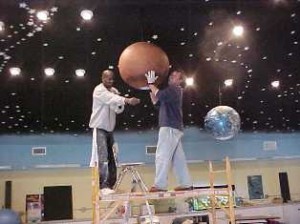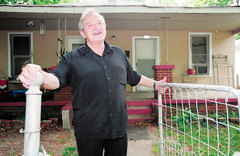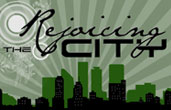Deploying our vocational power to advance foretastes of the Kingdom of God.
Vocational Stewardship
Your cart is empty
Read More
How Can a Church Rejoice Its City?
The combination of “missional church outreach” and “vocational stewardship”is producing profound joy and transformation for both the believers serving and the communities served. The value of this vital combination is its potential for greatly enhancing the effectiveness of outreach while simultaneously increasing the attractiveness of service.
Proverbs 11:10 describes the recipe for this profitable mix. It proclaims: “When the righteous prosper, the city rejoices.”
The latter part of this little text is all about missional outreach. The key word is “rejoice.” This Hebrew term is used just one other time in the Old Testament. It’s about the kind of ecstatic gladness and relief that arises when you’ve felt oppressed, and then your enemy is overthrown and God gives you victory.
This begs two questions. First, what prompts a city to this kind of gladness? It cannot be mere charity. Give a homeless guy a buck or a burger and he’ll likely smile. But what if you were able to help this homeless man get a job, healthcare, and his own, safe apartment—and you and your friends offered him loving community, and he met Jesus and got healed and saved? Well, if you brought that level of radical transformation to his life, then he just might start jumping for joy.
Second, is the kind of outreach we’re doing through our church resulting in this level of celebration? Being missional should mean we’ve joined King Jesus on his grand mission of pushing foretastes of the Kingdom into our lost and hurting communities. So, is our outreach bringing about the kind of robust, holistic community transformation that offers people new tastes of justice, life, peace, beauty, and wholeness? Is a greater measure of shalom entering our neighborhoods because of our ministries?
The first part of Proverbs 11:10 explains how this big vision can be advanced. The “righteous” are the tsaddiqim, people in love with God who are devout doers of justice. When the tsaddiqim prosper, they don’t see their blessings as a means of self-enrichment. No, they know that every dimension of their prosperity—their assets, gifts, knowledge, and networks—is meant to be stewarded for the common good. The tsaddiqim deploy their assets and vocational power strategically to advance Kingdom values, telling and demonstrating the Good News. Through their efforts, genuine progress is made in the fights against poverty, lack of opportunities, alienation, and hopelessness.
The promise of Proverbs 11:10 can be seen in a place called Lincoln Village in Huntsville, AL. Eight years ago this community was rife with violence and drugs. Three-quarters of families rented their homes, and over 40 percent of those rentals were in neglected condition. Some lacked complete plumbing or kitchen facilities. At Lincoln Elementary School, 96 percent of students were enrolled in the free lunch program, showing the wide extent of poverty. Kids’ reading and writing scores on standardized tests were down in the 20th to 30th percentiles. A sense of hopelessness was palpable and some residents thought an angry God was judging them.
In 2003, Mark Stearns, Director of Mercy Ministries for Southwood Presbyterian Church in Huntsville, began befriending families in Lincoln Village. Troubled by the conditions he saw, Mark brought back then-Senior Pastor Mike Honeycutt to meet a family. Honeycutt remembers: “I was just overwhelmed by the fact that six miles north of our nice middle class suburb…we [had] incredible poverty, as bad an anything you’d see in the Appalachian mountains.”
After they concluded the visit and walked outside, Honeycutt turned to Mark and declared, “This is where the Kingdom of God needs to be.”
Church leaders began strategizing about how to address the Lincoln Village community holistically—its spiritual, emotional, physical, and educational needs. They knew their commitment would need to be very long-term and focused on building strong relationships with residents, not just writing checks.
Mark emphasized to Southwood’s large fellowship that “everybody had the responsibility of being part of the solution to the problems in the community.” Although he never used the term “vocational stewardship,” recruiting people according to their skills sets was on Mark’s radar screen from the beginning. “Mark would ask people that wanted to help, ‘What are you good at? What do you like to do?’” Honeycutt remembers.
Recruiting people by vocational gifts hardly sounds like rocket science. In fact, though, it rarely happens. Nearly all churches affirm that they want to help members employ their “time, talent, and treasure” in God’s Kingdom. But according to veteran church consultant Dr. Don Simmons, who’s been assisting churches with their “equipping” ministries for decades, “There are very few churches that have strong, intentional systems for deploying their people’s time and talent.” The same churches may have thoughtful processes in place for capturing the congregation’s treasure; but, he laments, “They don’t think of people’s use of their talent in the same way.” In addition, few churches keep records on members’ occupations, making mobilization by vocational specialty difficult. And while many churches may have spiritual gifts assessments in place, they lack procedures for inventorying members’ vocational gifts.
At Southwood, though, Mark Stearns knew he needed the members’ vocational know-how and networks to accomplish the church’s robust vision for community transformation in Lincoln Village. He began by focusing on the needs at Lincoln Elementary. Mark mobilized educators from Southwood to help in upgrading the school’s library and launching tutoring programs. An old, unused gymnasium stood on school grounds; together, teachers from Lincoln and visionaries from Southwood turned it into a giant science lab boasting a replica of the solar system, an aquarium, and a terrarium. Scientist Frank Six from Southwood caught Mark’s passion and plumbed his network at NASA’s Marshall Space Flight Center to provide materials. 
Former English teacher Margaret Powell jumped at the opportunity for involvement. She started as a tutor and science lab helper, then was asked by Lincoln administrators if she’d consider serving as an intervention specialist to work with small groups of kids at risk of falling through the cracks. Soon Powell was volunteering twenty hours a week there—and considered it a joy, not a burden. “What I’m doing is the fulfillment of something I’ve always known God was calling me to,” Powell says. She explains that serving within her vocational sweet spot makes it possible to sustain a high level of commitment. “God just wired me to be a teacher,” she says. “This is something I’ve always dreamed of doing.”
In the first few years of ministry, Southwood and other churches recruited by Mark provided tutors for half of Lincoln’s 200+ students. Additionally, physicians and dentists from Southwood and other congregations agreed to donate free health care to kids and adults in need in the neighborhood. Lay people with administrative and organizational gifts created a new food and clothing bank. As Lincoln Village parents witnessed all these investments being made, their own hope and excitement grew—to the point where PTA attendance soared from six to over 100. Kids’ test scores started improving markedly, too. Last year, Lincoln Elementary won the prestigious Panasonic National School Change awards competition. Only six schools across the country are chosen. In Lincoln Village, jubilant celebration ensued.
Attorney Derek Simms knows something of this kind of rejoicing, too. He’s provided pro-bono legal services to about twenty Lincoln residents with problems they worried were insoluble. He has helped people to get their driver’s licenses renewed, clear up back fines, or get into special kinds of subsidized housing when their applications were initially denied. He’s also aided a woman in a domestic violence situation to secure a protection order and assisted single moms in obtaining child support from their children’s fathers. “There is so much joy,” Derek enthuses, “out of letting people know, ‘Hey, these problems are taken care of.’” And his clients aren’t the only ones smiling. Laughingly, Derek recalls the year he volunteered at Southwood as a second grade Sunday School teacher. “I just dreaded it!” he admits. He says he used to be jealous of his doctor friends, seeing them use their vocational skills on short-term medical missions trips. Now he’s found his own way to serve using his occupational know-how.
For wisdom and action in responding to the housing needs in Lincoln Village, Mark Stearns turned to Southwood engineer and elder Mike Stanfield. Mike quickly recruited a building contractor, a real estate attorney, business guys, and two appraisers from the congregation. “I guess that’s a skill set I have,” Stanfield says. “To see what’s needed and then to pull it all together to make something happen.”
Stanfield’s team established the Lincoln Village Preservation Corporation (LVPC) in May 2003 with the mission of purchasing homes in Lincoln Village, refurbishing them with volunteer labor, and eventually assisting renters in becoming homeowners. To date, LVPC has purchased 40 homes; 28 have been fully refurbished and grateful families are rejoicing in their quality housing. The building blitz also caught the attention of local drug dealers: they’ve moved on to other corners of the community.
Now The Village Church, a plant from Southwood that combines community residents, ministry volunteers, and other God-seekers under the leadership of young, African-American preacher Alex Shipman, gathers about 70 worshippers each Sunday. Its Women at the Well ministry is teaching the Bible to single moms in the neighborhood. The church is located in the same area as LVPC’s housing re-development, creating a sense of community and an oasis of peace where once violence reigned. “It’s quiet,” Mark describes. “You see kids playing together. You see neighbors talking to each other.”
Southwood’s story illuminates the symbiotic relationship of missional orientation and vocational stewardship. First, only a missional perspective will give rise to the kind of robust, comprehensive outreach vision that creates on-ramps for parishioners to serve through their professional talents. Suppose, for example, that the church’s vision for community ministry is limited to offering free food once a month for low-income families through a food pantry (a common form of traditional outreach). In this initiative, the church won’t be asking its dentists and nurses to share their medical skills on behalf of those families. It won’t be asking its bankers and economists to apply their financial minds to fighting the predatory lending these families may be victimized by. It won’t be asking its businesspeople to come alongside potential entrepreneurs among these families, or its educators to tutor these families’ children. No. It will be asking its dentists, nurses, bankers, economists, businessmen, and educators for…their canned goods.
Second, vocational stewardship is an essential strategy for accomplishing the big, bold vision of bringing foretastes of shalom into a community. A congregation doesn’t really need this strategy if its outreach vision is limited to handing out tracts or delivering holiday meals. But if the church wants to join King Jesus on His mission of rejoicing the city, it will need a mobilization approach that draws thoroughly on all that the congregants have to offer—their expertise, networks, influence, platforms, and skills.
Churches that embrace the missio Dei accept an exhilarating but deeply challenging journey: to offer service that’s relevant to the world’s groaning and that produces change that actually sets people to dancing. But God has resourced His bride for this big work. He’s fashioned the people in our pews with spiritual and vocational gifts, passions and skills, life experiences and networks, knowledge and talents. It’s time to start drawing more intentionally on all of that.
[Dr. Amy L. Sherman directs the Center on Faith in Communities at the Sagamore Institute. Her new book, Kingdom Calling: Vocational Stewardship for the Common Good releases in December from InterVarsity Press.]


